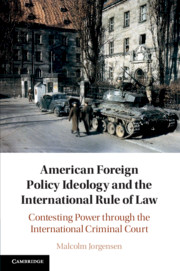 American Foreign Policy Ideology and the International Rule of Law
American Foreign Policy Ideology and the International Rule of Law Book contents
- American Foreign Policy Ideology and the International Rule of Law
- American Foreign Policy Ideology and the International Rule of Law
- Copyright page
- Contents
- Tables
- Foreword
- Acknowledgements
- Abbreviations
- Introduction
- Part I Ideology in American International Law Policy
- 1 America’s ‘Exceptional’ International Law Policy
- 2 The Structure of American Foreign Policy Ideology
- 3 Competing Conceptions of the International Rule of Law
- Part II Contesting Global Legal Power through the ICC
- Index
3 - Competing Conceptions of the International Rule of Law
from Part I - Ideology in American International Law Policy
Published online by Cambridge University Press: 12 December 2019
- American Foreign Policy Ideology and the International Rule of Law
- American Foreign Policy Ideology and the International Rule of Law
- Copyright page
- Contents
- Tables
- Foreword
- Acknowledgements
- Abbreviations
- Introduction
- Part I Ideology in American International Law Policy
- 1 America’s ‘Exceptional’ International Law Policy
- 2 The Structure of American Foreign Policy Ideology
- 3 Competing Conceptions of the International Rule of Law
- Part II Contesting Global Legal Power through the ICC
- Index
Summary
Chapter 3 revisits explanations for contradictory US policy via the ideological typology to develop a model of competing conceptions of the international rule of law. Opposition to US legal policy has converged on forms of ‘legalism’, as a set of beliefs that law consists of non-instrumental rules and that the international legal system should be developed by analogy with municipal law. The four ideal types, as well as legalism, are applied to reinterpret the classic Anglo-American conception of the rule of law composed of three elements that, when translated to the global level, are concerned with: how to develop non-arbitrary global governance; how to define equality under IL defined; and how to determine the integrity of international judicial power. Each element of the rule of law has been interpreted in a distinctive form by the competing ideologies, thus establishing a structured contest over principles for designing and developing global legal institutions. The meaning of ‘coherence’ becomes that a legal policymaker’s interpretation of any one of the three elements is a reliable indicator of positions taken on remaining elements.
Keywords
- Type
- Chapter
- Information
- American Foreign Policy Ideology and the International Rule of LawContesting Power through the International Criminal Court, pp. 79 - 120Publisher: Cambridge University PressPrint publication year: 2020
